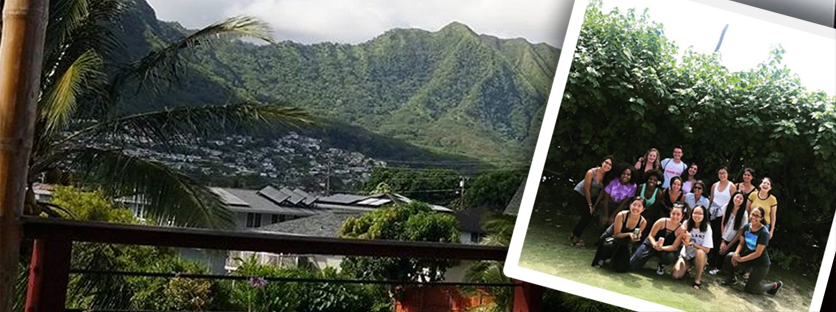
Hands-On Learning in Hawaii
An eight-day trip to the island brings lessons home for students studying race and indigeneity in the Pacific
By Daniel P. Smith
Perhaps it was the building of lava rock walls at a traditional Hawaiian fish pond or the exploratory tours of local fish and vegetable markets.
Or maybe when students mashed fertilizer into taro fields with their bare feet or witnessed performances of Polynesian culture at the Mormon-affiliated Polynesian Cultural Center.
For 15 Northwestern undergraduates, the eight-day trip to Hawaii in September proved to be a memorable preparation for their class on “Race and Indigeneity in the Pacific” this fall.
The course, taught by Nitasha Sharma, director of the University’s Asian American Studies Program, along with postdoctoral fellow Hi’ilei Julia Hobart, immersed the students in the experience of indigeneity.
And that, said Hobart, was the idea.
“As people who live in the United States, we are so very often taught that indigenous issues and histories are separate from American issues and histories writ large,” Hobart says.
“But I believe this trip helped students see that these are deeply intertwined. This is indigenous land and these issues sit below the surface, shifting our perspective of American identity and politics and how we situate ourselves in the world.”
A hands-on exploration
During the Sept. 10-18 trip, students paired a hands-on exploration of Hawaiian culture with face-to-face discussions with local academics, activists and cultural practitioners. The experience was funded by the dean’s offices at both Weinberg College and the School of Education and Social Policy, the Alice Kaplan Institute for the Humanities, the Department of American Studies, the Buffett Institute for Global Studies, the Latina & Latino Studies Program, the African American Studies Program and the Asian American Studies Program.
Hobart, who like Sharma was born and raised in Hawaii, believes the trip’s many experiential learning opportunities and interactions helped students understand how to work in communities that are not their own. Those skills involve understanding power dynamics, being aware of their place, engaging humbly with Indigenous peoples, and requesting permission to enter and learn.
“When you work with Native communities in particular, this becomes an important aspect of ethical research practice,” Hobart says. “For undergrads, who do the majority of their learning in the classroom, I hope they take these very real lessons with them wherever they go in life.”
Anna DiStefano ’18 embraced that lesson.
“Our trip to Hawaii reminded me to engage more consciously with the world, centering relationships between people, places and things and asking questions about the history and purpose of tasks and objects,” she says.
"Experiential and embodied learning"
When the fall quarter commenced on the Evanston campus in September, Hobart noticed more meaningful and personal classroom discussions as well as deeper buy-in from the 15 students who now relate to Hawaii and its indigenous issues in real rather than abstract terms.
“So much of the philosophy around indigenous learning comes through experiential and embodied learning, and the best way to process place and people is to talk with them, work with them and provide community service to them,” Hobart says.
An example of Northwestern’s continued focus and scholarship with regard indigenous issues, the unique course will conclude later this fall with a student-led, student-directed research symposium in which students will present final projects examining a range of indigenous topics such as food sovereignty, women’s activism and decolonizing education.